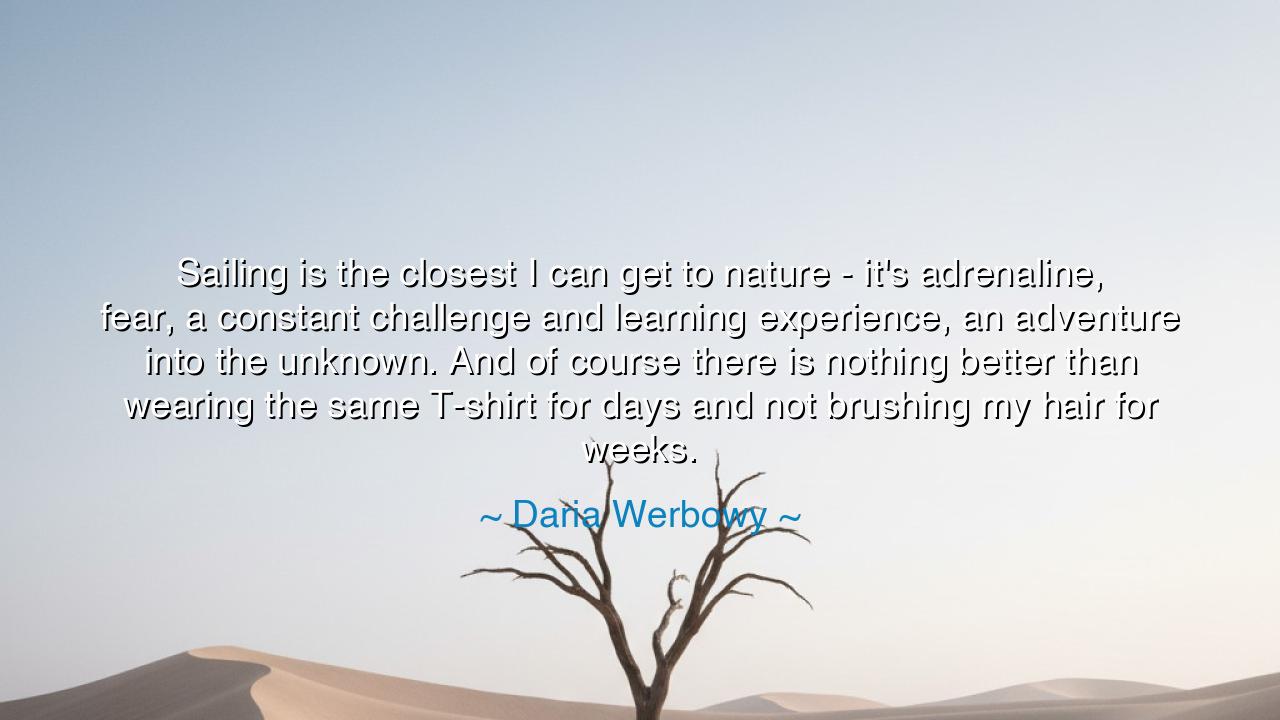
Sailing is the closest I can get to nature - it's adrenaline
Sailing is the closest I can get to nature - it's adrenaline, fear, a constant challenge and learning experience, an adventure into the unknown. And of course there is nothing better than wearing the same T-shirt for days and not brushing my hair for weeks.






“Sailing is the closest I can get to nature — it's adrenaline, fear, a constant challenge and learning experience, an adventure into the unknown. And of course there is nothing better than wearing the same T-shirt for days and not brushing my hair for weeks.” – Daria Werbowy
In these vivid and heartfelt words, Daria Werbowy, the renowned model turned wanderer of the seas, speaks not only of sailing, but of freedom, authenticity, and the eternal yearning of the human soul to return to what is real. She, who once walked among lights, cameras, and crafted beauty, found her truest reflection not on the runway, but upon the restless waters — where man and nature meet in both harmony and struggle. Her quote is a hymn to simplicity, to the untamed essence of life that civilization so often hides beneath layers of comfort and control.
The origin of this insight comes from Werbowy’s own life, when, at the height of fame, she chose to step away from the glamour of the fashion world and seek meaning beyond its mirrors. She turned instead to the sea — that vast, living mystery — and in its company rediscovered what it means to be human. In her words, sailing becomes not a sport or leisure, but a metaphor for existence itself. It is, as she says, “adrenaline, fear, a constant challenge and learning experience.” For on the open sea, there is no illusion of mastery — only respect for forces greater than oneself, and the humility to adapt, to learn, and to survive.
This truth has echoed through time. The ancients revered the sea not as a playground, but as a teacher. Odysseus, the wandering king of Ithaca, learned through the waves that courage is not the absence of fear, but endurance in its midst. His journey home was not only across waters, but through wisdom — through trial, error, and revelation. So too does Werbowy’s sailing embody the ancient rite of the traveler who confronts both nature’s vastness and the soul’s depth. The sea strips away vanity; it offers no applause, no audience — only truth. When she speaks of not brushing her hair, of wearing the same shirt for days, it is not defiance of elegance, but a celebration of liberation: the joy of being unmasked before the wind and waves.
There is also in her words a recognition of balance — the dance between chaos and calm, between beauty and danger. “Adrenaline, fear, and challenge,” she says — for life upon the sea is not gentle. The sailor must read the skies, listen to the wind, feel the shifting moods of the water. A storm teaches humility; a sunrise teaches gratitude. And in both, there is learning — constant, unending learning. This, Werbowy suggests, is the heart of true living: to remain a student of the world, to embrace both exhilaration and uncertainty as sacred teachers.
To live close to nature, as she does, is to remember what modernity often forgets — that we are not above the earth, but of it. In her sea-bound simplicity, she finds a kind of peace that wealth cannot buy, nor luxury replicate. When she speaks of wearing the same shirt for days, it is a quiet rebellion against the world’s obsession with appearances. It is a return to essence — where identity is shaped not by fabric or fame, but by resilience, by authenticity, and by wonder. The sea does not care how we look; it asks only how well we listen.
History gives us another mirror to this truth in the life of Captain Joshua Slocum, the first man to sail alone around the world. When he set forth in 1895 aboard his small vessel, Spray, he faced loneliness, storms, and perilous seas. Yet he wrote afterward that the voyage had freed him — that isolation and challenge had reconnected him to the eternal rhythm of the earth. Like Werbowy, he discovered that to sail is not merely to move across water, but to move closer to the self, stripped of pretense and guided only by the stars.
So let this be the lesson: seek your own sea, whatever form it takes. For some, it may be the wilderness; for others, the open road, the studio, the classroom, the quiet struggle toward a dream. Step into the unknown with courage, and let fear become your companion, not your captor. Simplify your life, so that you may feel the pulse of the world again — the wind, the sun, the texture of the moment. As Werbowy teaches, there is no shame in imperfection, no disgrace in dishevelment. The truest beauty is not polished — it is lived.
And when you return from your voyage, whether by sea or by spirit, remember this: the world may clamor for perfection, but the soul seeks truth. So wear your worn shirt proudly, let your hair fall free, and cherish the lessons of every storm. For in the end, as Daria Werbowy reminds us, the adventure of living — raw, wild, and real — is the only voyage worth taking.






AAdministratorAdministrator
Welcome, honored guests. Please leave a comment, we will respond soon